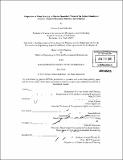| dc.contributor.advisor | JoAnn Carmin and Susan Murcott. | en_US |
| dc.contributor.author | Sudhalkar, Amruta Anand | en_US |
| dc.contributor.other | Massachusetts Institute of Technology. Dept. of Civil and Environmental Engineering. | en_US |
| dc.coverage.spatial | ah----- | en_US |
| dc.date.accessioned | 2011-03-07T15:17:14Z | |
| dc.date.available | 2011-03-07T15:17:14Z | |
| dc.date.copyright | 2010 | en_US |
| dc.date.issued | 2010 | en_US |
| dc.identifier.uri | http://hdl.handle.net/1721.1/61573 | |
| dc.description | Thesis (M.C.P.)--Massachusetts Institute of Technology, Dept. of Urban Studies and Planning; and, (M. Eng.)--Massachusetts Institute of Technology, Dept. of Civil and Environmental Engineering, 2010. | en_US |
| dc.description | Cataloged from PDF version of thesis. | en_US |
| dc.description | Includes bibliographical references (p. 195-203). | en_US |
| dc.description.abstract | Among the existing and projected impacts of climate change, impacts on water resources are expected to exacerbate the current and future threat of global water scarcity. Glacier-dependent societies are especially vulnerable to water scarcity due to the more pronounced effects of climate change on glacial systems that govern the water availability of these societies. In this thesis, water scarcity is examined as an impact of climate change in Dharamshala and Leh, two glacier-dependent towns of northern India, while recognizing that climate change is not the only factor causing depletion of water resources in these towns. In order to show the linkage between climate change and water scarcity, evidence is presented on changes occurring in the towns' local climate parameters such as snowfall, rainfall and temperature, as well as changes in the hydrology of the water bodies that make water available to these towns. This establishes that water scarcity in these towns has been induced not only by increasing demand, but also by decreasing supply of water. In light of the water scarcity facing these towns, an investigation of the measures taken by their local governments to address this issue is presented, which reveals that the primary adaptive response employed in both towns has been supply augmentation. The driver behind this response has been the pursuit of economic development to improve the standard of living of Dharamshala and Leh's constituents. It is argued that economic development as a driver has not been effective in inducing holistic adaptive responses to water scarcity. Additionally, climate change considerations have been largely absent in the policy/planning processes that govern water management in both towns, implying that the responses of Dharamshala and Leh to water scarcity have been influenced by the pursuit of short-term economic benefits in a local economy that fails to recognize the importance of the integrity of water resources to its sustenance. The perpetuation of unsustainable economic development and failure to account for climate change impacts in local water management points to the presence of several technological, structural, financial, and political barriers to the planning/implementation of holistic climate-centric strategies for adaptation to water scarcity in Dharamshala and Leh. Therefore, in the concluding part of this thesis, recommendations are offered to enable the local governments of Dharamshala and Leh to overcome these barriers. | en_US |
| dc.description.statementofresponsibility | by Amruta Anand Sudhalkar. | en_US |
| dc.format.extent | 206 p. | en_US |
| dc.language.iso | eng | en_US |
| dc.publisher | Massachusetts Institute of Technology | en_US |
| dc.rights | M.I.T. theses are protected by
copyright. They may be viewed from this source for any purpose, but
reproduction or distribution in any format is prohibited without written
permission. See provided URL for inquiries about permission. | en_US |
| dc.rights.uri | http://dspace.mit.edu/handle/1721.1/7582 | en_US |
| dc.subject | Urban Studies and Planning. | en_US |
| dc.subject | Civil and Environmental Engineering. | en_US |
| dc.title | Adaptation to water scarcity in glacier-dependent towns of the Indian Himalayas : impacts, adaptive responses, barriers, and solutions | en_US |
| dc.type | Thesis | en_US |
| dc.description.degree | M.Eng. | en_US |
| dc.description.degree | M.C.P. | en_US |
| dc.contributor.department | Massachusetts Institute of Technology. Department of Civil and Environmental Engineering | |
| dc.contributor.department | Massachusetts Institute of Technology. Department of Urban Studies and Planning | |
| dc.identifier.oclc | 703279015 | en_US |
